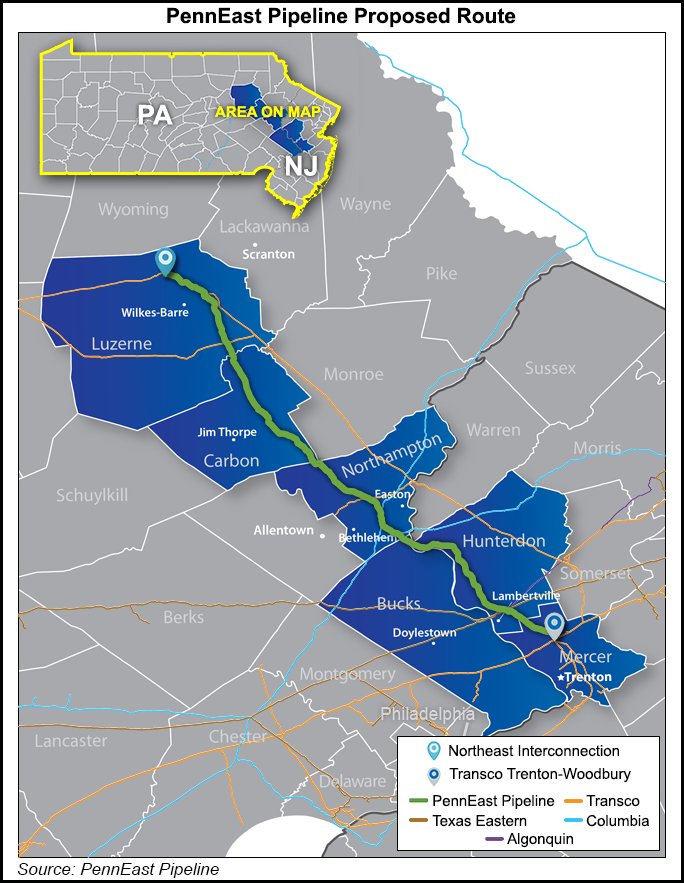Regulatory | Infrastructure | NGI All News Access | NGI The Weekly Gas Market Report
FERC Delays Action on PennEast Pipeline’s Eminent Domain Petition
A request from PennEast Pipeline Co. LLC for an order interpreting the Natural Gas Act’s (NGA) eminent domain authority, which had been on the agenda for FERC’s open meeting in Washington, DC, Thursday, was postponed by the Commission until later this month.

In November, a federal appeals court rebuffed Penneast’s efforts to overturn an adverse ruling issued in September that prevents the developer from condemning state-owned lands in New Jersey. The U.S. Court of Appeals for the Third Circuit denied a petition for rehearing filed by PennEast, upholding an earlier decision that rejected the pipeline’s use of eminent domain on 42 parcels under state ownership, or in which the state has an interest.
The decision created a major roadblock for the embattled PennEast project, a 120-mile pipeline designed to move more than 1 Bcf/d of Appalachian natural gas to markets in Pennsylvania and New Jersey. In response, PennEast vowed to take its fight to the U.S. Supreme Court.
Chairman Neil Chatterjee said Thursday the Federal Energy Regulatory Commission was striking PennEast’s item from the agenda and would issue a Sunshine Act notice to consider the item at a meeting later this month [RP20-41].
“It is hard to overstate the importance of the court’s decision or the importance of the issues raised in PennEast’s petition,” Chatterjee said. “In order to ensure that the Commission has sufficient time to work through the complexities of PennEast’s petition, we will hold an open meeting next week to ensure that the item is considered in a timely manner, and to ensure that all interested stakeholders will be able to attend and review the proceedings.”
In its petition, PennEast asked FERC to issue an order concluding that certificate holders’ authority to condemn the necessary right-of-way to build, operate and maintain pipelines “applies to property in which a state holds an interest.” PennEast also asked FERC to find that in NGA, Congress delegated the federal government’s eminent domain authority to certificate holders, and in doing so delegated to certificate holders the federal government’s exemption from claims of state sovereign immunity.
PennEast received a certificate from FERC early in 2018, but it has struggled to make progress amid pushback at the state level. New Jersey’s Department of Environmental Protection, which has resisted PennEast’s efforts to secure necessary state-level approvals, cited the Third Circuit’s decision when it denied a water quality certification and other key permits for the project.
The case before the Third Circuit centered around whether the Eleventh Amendment of the U.S. Constitution prevents pipeline developers from using federal eminent domain authority granted by the FERC under NGA. After obtaining FERC approval for the project, PennEast sued the state to condemn the land. New Jersey sought to dismiss the complaint for lack of jurisdiction, citing the Eleventh Amendment, which recognizes that states have sovereign immunity from lawsuits by private parties in federal court.
Certificates issued by FERC under the NGA allow private gas companies to take property by eminent domain. However, in its opinion, the Third Circuit said New Jersey’s sovereign immunity wasn’t revoked by the project’s certificate, “nor has there been — as PennEast argues — a delegation of the federal government’s exemption from the state’s sovereign immunity.”
Project sponsors recently asked FERC for another two years to finish constructing the PennEast Pipeline, which had originally been scheduled for completion by Jan. 19, 2020. Citing various regulatory hurdles in Pennsylvania and New Jersey, the company asked the Commission to extend the deadline to Jan. 19, 2022.
PennEast is a joint venture of Enbridge Inc., NJR Pipeline Co., SJI Midstream, Southern Co. Gas and UGI Energy Services.
© 2024 Natural Gas Intelligence. All rights reserved.
ISSN © 1532-1231 | ISSN © 2577-9877 | ISSN © 1532-1266 |
